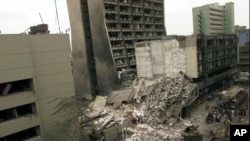Kenyan victims of the 1998 U.S. Embassy bombing in Nairobi on Monday renewed calls for compensation from Washington as the East African nation marked 25 years since its deadliest terror attack.
A powerful blast hit the U.S. Embassy in downtown Nairobi on Aug. 7, 1998, killing 213 people and injuring over 5,000 — most of them pedestrians or office workers in the adjacent buildings.
Minutes later, another explosion rocked the U.S. mission in Dar es Salaam, in neighboring Tanzania.
The twin bombings, claimed by al-Qaida, killed a total of 224 people and went on to shape how a generation thinks about personal security.
The attack "still feels fresh" a quarter century later, said Anisa Mwilu, who lost her husband in the blast.
"What we can ask is for compensation," she said, to applause from several hundred people gathered a memorial park in the Kenyan capital for a remembrance ceremony for those killed.
Caroline Muthoka, a member of a victims' group, urged the U.S. Congress to approve legislation to cover medical expenses and education costs for survivors and their families.
Muthoka described the failure of the U.S. government to compensate victims as an "injustice.”
'My back was on fire'
Redempta Kadenge Amisi, who was in a building flattened by the explosion, said she needed financial assistance to cover the costs of her twice-daily medication.
"The three people I was with were killed instantly. I didn't realize it, but my back was on fire," she said of injuries that hospitalized her for over a month. "Since the attack, I haven't received anything ... but I still hope to get some."
Both Kenyan and U.S. officials attended the ceremony, where the names of all the victims were read aloud and candles were lit in memory.
The 1998 attack thrust al-Qaida onto the global stage and was the first in a series of bloody assaults in the East African nation.
Since the October 2011 deployment of the Kenyan military in Somalia to fight the al-Qaida affiliate al-Shabab, there has been an upsurge in revenge attacks over the border.
In September 2013, al-Shabab gunmen stormed Nairobi's Westgate mall, killing at least 67 people.
Another al-Shabab attack in April 2015 at a university in the eastern Kenyan city of Garissa left 148 people dead.
In January 2019, the group laid siege to a hotel complex in Nairobi, killing 21 people.




